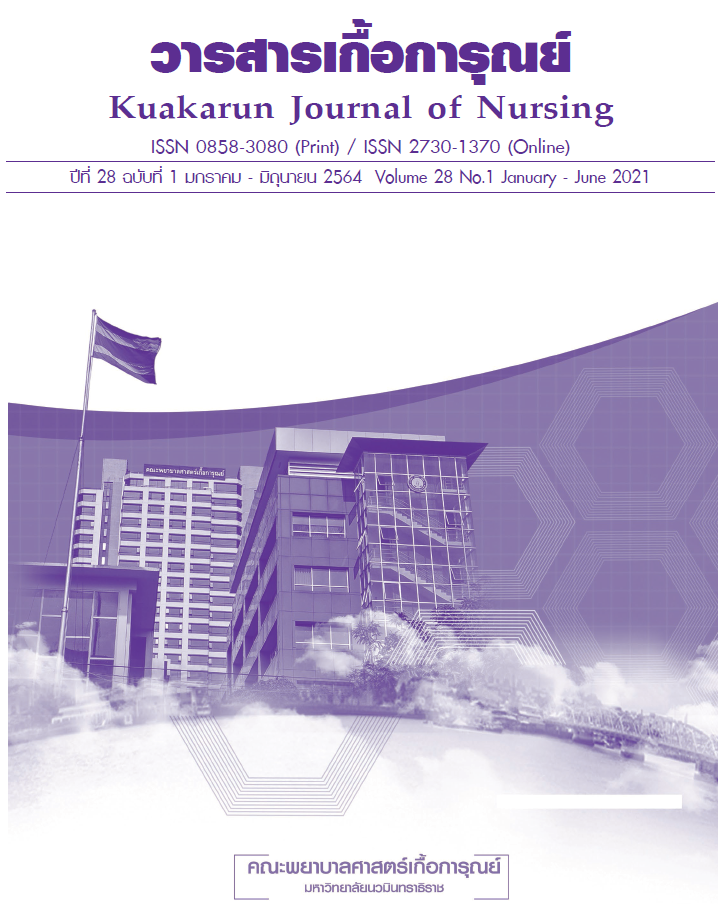ความรู้และการรับรู้สมรรถนะในการดูแลแบบประคับประคองของพยาบาลวิชาชีพที่มีประสบการณ์ทำงานน้อยกว่า 2 ปี ในโรงพยาบาลของมหาวิทยาลัยในกำกับของรัฐ
คำสำคัญ:
ความรู้, การรับรู้สมรรถนะ, การดูแลแบบประคับประคอง, พยาบาลวิชาชีพบทคัดย่อ
การวิจัยเชิงพรรณนานี้ มีวัตถุประสงค์เพื่อศึกษาความรู้ และการรับรู้สมรรถนะในการดูแลแบบประคับประคองของพยาบาลวิชาชีพที่มีประสบการณ์ทำงานน้อยกว่า 2 ปี ในโรงพยาบาลมหาวิทยาลัยแห่งหนึ่งในกำกับของรัฐ กลุ่มตัวอย่างคือพยาบาลวิชาชีพจำนวน 126 คน เครื่องมือที่ใช้ในการวิจัยประกอบด้วย (1) แบบสอบถามข้อมูลส่วนบุคคล (2) แบบสอบถามความรู้ของพยาบาลเกี่ยวกับการดูแลแบบประคับประคอง (3) แบบสอบถามพยาบาลประเมินตนเองด้านสมรรถนะในการดูแลแบบประคับประคอง ตรวจสอบความตรงตามเนื้อหาโดยผู้ทรงคุณวุฒิ 5 ท่าน แบบสอบถามความรู้ของพยาบาลเกี่ยวกับการดูแลแบบประคับประคองมีค่าดัชนีความตรงเชิงเนื้อหาเท่ากับ .80 มีค่าความเที่ยงโดยใช้สูตร KR-20 เท่ากับ .70 และแบบสอบถามพยาบาลประเมินตนเองด้านสมรรถนะในการดูแลแบบประคับประคอง มีค่าความตรงเชิงเนื้อหาเท่ากับ .95 และความเที่ยงสัมประสิทธิ์แอลฟ่าครอนบาคเท่ากับ .98 วิเคราะห์ข้อมูลโดยการแจกแจงความถี่ ร้อยละ ค่าเฉลี่ย และส่วนเบี่ยงเบนมาตรฐาน
ผลการวิจัย พบว่า ความรู้ในการดูแลแบบประคับประคองของพยาบาลวิชาชีพโดยรวมอยู่ในระดับมาก โดยมีระดับความรู้ในการดูแลผู้ป่วยแบบประคับประคองในการติดต่อสื่อสารในการดูแลผู้ป่วยระยะสุดท้ายสูงที่สุด ( = .88, S.D = .19) ส่วนด้านการจัดการกับอาการต่าง ๆ ในผู้ป่วยระยะสุดท้าย มีค่าคะแนนเฉลี่ยน้อยที่สุด (
= .63, S.D = .16) และการรับรู้สมรรถนะในการดูแลแบบประคับประคองส่วนใหญ่ มีความมั่นใจในการดูแลแบบประคับประคองอยู่ในระดับปานกลาง โดยมีคะแนนเฉลี่ยความมั่นใจในด้าน การดูแลในระยะใกล้ตายสูงที่สุด (
= 2.96, S.D = .82) ส่วนด้านที่พบว่ามีคะแนนเฉลี่ยความมั่นใจต่ำสุด ได้แก่ ด้านการสื่อสารและการให้คำปรึกษา (
= 2.62, S.D = .79) มีระยะเวลาปฏิบัติงานเฉลี่ย 13.23 เดือน มีประสบการณ์ทำงานในการดูแลผู้ป่วยระยะสุดท้ายอยู่ระหว่าง 5 - 10 ราย มากที่สุด คิดเป็นร้อยละ 51.00 เคยเรียนเรื่องการดูแลแบบประคับประคองในสถานศึกษาเฉลี่ย 15.97 ชั่วโมง ส่วนใหญ่ไม่เคยอบรมเรื่องการดูแลผู้ป่วยแบบประคับประคอง คิดเป็นร้อยละ 87.30 ดังนั้น พยาบาลควรได้รับการส่งเสริมสมรรถนะในการดูแลแบบประคับประคอง โดยการให้ความรู้ ฝึกทักษะ ประสบการณ์ และการอบรมเกี่ยวกับการดูแลแบบประคับประคองเพิ่มเติม โดยเฉพาะในทักษะด้านการสื่อสาร และการให้คำปรึกษา
เอกสารอ้างอิง
Nursing Division Ministry of Public Health. Palliative care system. Bangkok: Publishing of Suetawan; 2016. (in Thai)
Jamjan L, Chaleoykitti S. Trend of palliative care in the bachelor of nursing science curriculum. Journal of The Royal Thai Army Nurses 2017;18(1):22-8. (in Thai)
Faculty of Nursing, Khon Kaen University. Training program in palliative nursing (post baccalaureate program). Khon Kaen: Khon Kaen University; 2018. (in Thai)
Nuekwen P, Hanprasitkam K, Junda T. Nurses’ perceptions and practice on palliative care. Thai Journal of Cardio-Thoracic Nursing 2016;27(1):128-41. (in Thai)
Montagnini M, Smith HM, Price DM, Ghosh B, Strodtman L. Self-perceived end-of-life care competencies of health-care providers at a large academic medical center. The American Journal of Hospice & Palliative Care 2018;35(11):1409-16.
Pilaikiat R, Rittharomya J, Bootchan T. Spiritual care for chronic illness patients: experiences of professional nurses. Thai Journal of Nursing Council 2009;24(1):62-76. (in Thai)
Pongprawat N, Choochom O, Intarakamhang U. Psychological characteristics and nurse socialization related to job performance as professional nursing roles of new graduated nurses autonomous university hospitals in Bangkok. Journal of Behavioral Science for Development 2010;2(1):29-42. (in Thai)
Purling A, King L. A literature review: graduate nurses' preparedness for recognising and responding to the deteriorating patient. Journal of Clinical Nursing 2012;21(23-24):3451-65.
Raetong P, Harnirattisai T. Role change experience: from nursing students to registered nurses. Thai Journal of Nursing Council 2012;27(2):51-62. (in Thai)
Benner P. From novice to expert: excellence and power in clinical nursing practice. Menlo Park: Addison-Wesley; 1984.
Kuakarun Faculty of Nursing, Navamindradhiraj University. Curriculum of bachelor of nursing science program. Bangkok: Kuakarun Faculty of Nursing; 2016. (in Thai)
Institute of Medicine. Approaching death: improving care at the end of life. Washington: The National Academies Press; 1997.
City of Hope Pain & Palliative Care Resource Center. The end of life knowledge assessment RN/LVN version [Internet]. 2012 [cited 2018 May 6]. Available from: https://www.midss.org/sites/default/files/instruments_3.pdf
Loknimith W, Janda T. Self-perceived palliative care competencies of nurses working in a university hospital within less than two years of receiving bachelor's degrees [Dissertation]. Bangkok: Mahidol University; 2019. (in Thai)
Desbiens J-F, Fillion L. Development of the palliative care nursing self-competence scale. Journal of Hospice & Palliative Nursing 2011;13(4):230-41.
Akarathanarak T. Novice nurses’s preparedness, knowledge and caring behavior for patients at the end of life [Dissertation]. Songkla: Prince of Songkla University; 2014. (in Thai)
Johnson A, Chang E, O'Brien L. Nursing the dying: a descriptive survey of Australian undergraduate nursing curricula. International Journal of Nursing Practice 2009;15(5):417-25.
Nguyen LT, Yates P, Osborne Y. Palliative care knowledge, attitudes and perceived self-competence of nurses working in Vietnam. International Journal of Palliative Nursing 2014;20(9):448-56.
Reinke LF, Shannon SE, Engelberg R, Dotolo D, Silvestri GA, Curtis JR. Nurses' identification of important yet under-utilized end-of-life care skills for patients with life-limiting or terminal illnesses. Journal of Palliative Medicine 2010;13(6):753-9.
Al-Kindi SG, Abu-Zeinah GF, Hassan AA. Palliative care knowledge and attitudes among oncology nurses in Qatar. American Journal of Hospice and Palliative Medicine 2014;31(5):469-74.
Sato K, Inoue Y, Umeda M, Ishigamori I, Igarashi A, Togashi S, et al. A Japanese region-wide survey of the knowledge, difficulties and self-reported palliative care practices among nurses. Japanese Journal of Clinical Oncology 2014;44(8):718-28.
McCabe MS, Coyle N. Ethical and legal issues in palliative care. Seminars in Oncology Nursing 2014;30(4):287-95.
Friberg F, Granum V, Bergh AL. Nurses' patient-education work: conditional factors - an integrative review. Journal of Nursing Management 2012;20(2):170-86.
Promsorn T. Nursing practices on palliative care of terminally III patients among nurses at Fang Hospital, Chiang Mai Province [Dissertation]. Chiang Mai: Chiang Mai University; 2008. (in Thai)
Mullen JE, Reynolds MR, Larson JS. Caring for pediatric patients' families at the child's end of life. Journal for the Critical Care Nurse 2015;35(6):46-56.

















